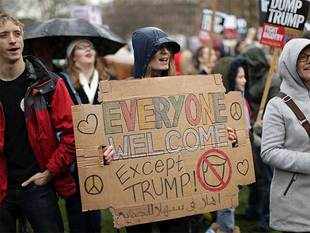Chennai-born Pramila Jayapal was elected to US Congress from Washington state last November, becoming the first Indian-American woman to serve in the US House. For long a champion of federal immigration reform, the former state senator has led movements for immigrants and is the founder of One America, Washington state’s largest immigrant rights organisation.
 No surprise that Jayapal was at the forefront of the fight for the rights of refugees and immigrants ever since President Donald Trump’s executive order banning refugees and immigrants from seven Muslim-majority countries last weekend. “This executive order was inhuman and undermines core American values. It has created confusion across our country, and thrown into fear and limbo families who await their loved ones and those who travelled across oceans,” said Jayapal. “We have won a temporary victory, halting the unconstitutional deportations of two people and keeping them from being sent away. Now, we must keep fighting.”
No surprise that Jayapal was at the forefront of the fight for the rights of refugees and immigrants ever since President Donald Trump’s executive order banning refugees and immigrants from seven Muslim-majority countries last weekend. “This executive order was inhuman and undermines core American values. It has created confusion across our country, and thrown into fear and limbo families who await their loved ones and those who travelled across oceans,” said Jayapal. “We have won a temporary victory, halting the unconstitutional deportations of two people and keeping them from being sent away. Now, we must keep fighting.”
Late Wednesday Jayapal, a Democrat, joined Congressman Dave Reichert, a Republican, to cosponsor a bill in the US House called the Bar Removal of Individuals who Dream and Grow our Economy (BRIDGE) Act. If passed, it will allow people who qualified for the Deferred Action for Childhood Arrivals (DACA) programme, of the Obama administration, to stay in the US for three years and protect people whose applications are pending.
In a statement, Jayapal called the bill “an important first step toward protecting these young people from deportation.” “Congresswoman Jayapal has been proactively reaching out to immigrants who have been hit by President Trump’s executive order. She has joined protesters at the Seattle-Tacoma airport and has been reaching out to support and help many immigrants, who are in limbo or have been turned away from the airport and sent back to their countries of origin, and their families,” Omer Farooque, a spokesperson for Jayapal, told ET Magazine.
The H-1B Conundrum
Jayapal, along with other Indian-American members of the US Congress, also protested against the selective immigration ban under the Asian American and Pacific Islanders (AAPI) Victory Fund, a fundraising organisation that represents Asian Americans and Pacific Islanders. “We are opposed to the executive order (EO) and believe that it is un-Republican, un-Democratic, un-American and unconstitutional. We are calling upon Congress to enact legislation to prevent any money being spent to enforce the EO,” said Shekar Narasimhan, chairman and founder of AAPI Victory Fund.
He added that the new bill that had been introduced to curtail H-1B visas was another cause for concern among the Indian-American community. “H-1B visa holders have enabled many tech companies in the US to grow and thrive. It would not be judicious to curtail or eliminate provisions pertaining to it as it will stifle American innovation and productivity. If there are abuses, address them.” Rishi Kumar, a council member of Saratoga in Silicon Valley, feels that President Trump’s follow through of his campaign promise to pass the executive order for visa bans is alarming. “There have been many cases of legitimate permanent residents of the US being detained on arrival.” Nish Acharya, CEO of Citizence, a firm that works with companies, governments, universities and investors, believes there is a strong chance that H-1B reductions will be announced soon via a presidential EO.
Sanjay Puri, chairman of the US India Political Action Committee (USINPAC), says he agrees that the H-1B visa system is prone to abuse. “These visas are not meant to replace Americans with cheap labour from India.”
There is, however, a section of Indian Americans that feels that there’s no reason for alarm. “The new bill that has been introduced on H-1B visas may not be passed. And even if it is, those Indians whose green card petitions have been approved don’t have any cause for worry,” says Vinson Palathingal, founder of the Indo-American Center, a freemarket think tank.
Shalabh Kumar, founder of the Republican Hindu Coalition, indicates that the US president has no plans to issue an EO to restrict H-1B visas. He reckons that the Republican administration is working towards plugging the abuse of H-1B visas and also believes that the White House will work to eliminate country-quota towards allocation of green cards for legal permanent residents. “This would be of great help to Indian IT professionals,” he said.
Source- The Economic Times


